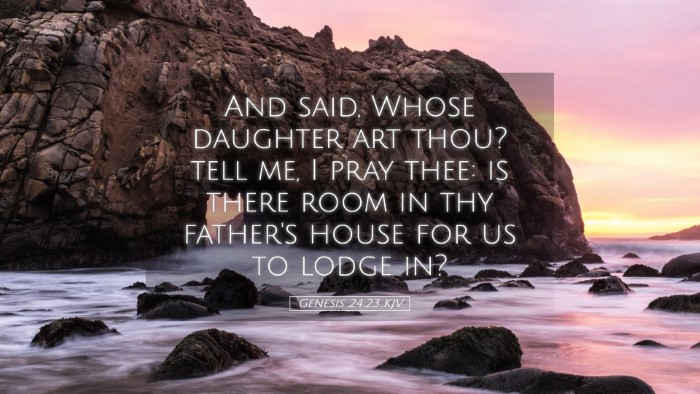Commentary on Genesis 24:23
Verse: “And said, Whose daughter art thou? tell me, I pray thee: Is there room in thy father’s house for us to lodge in?” (Genesis 24:23, KJV)
Introduction
Genesis 24 is a pivotal chapter in the narrative of the patriarch Abraham, particularly focusing on the quest for a suitable wife for Isaac. Within this chapter, verse 23 serves as a critical moment where Eliezer, Abraham's servant, engages with Rebekah, establishing the groundwork for the unfolding story of Isaac's marital union. This commentary synthesizes insights from notable public domain commentators: Matthew Henry, Albert Barnes, and Adam Clarke.
Contextual Analysis
The context of this verse is integral for understanding its significance. Abraham, being advanced in age, sends his servant to find a wife for Isaac from his relatives, emphasizing the importance of kinship and faithfulness to God’s promise. Eliezer’s journey is one of obedience and faith, paralleling the divine providence seen throughout the book of Genesis.
Commentary Insights
-
Matthew Henry’s Commentary
Matthew Henry emphasizes the servant’s commendable approach as he humbly inquires about Rebekah’s lineage, illustrating the virtues of discernment and prudence. His question, “Whose daughter art thou?” reflects the servant’s recognition of the importance of lineage and heritage. This underscores the broader biblical principle that God’s covenant is passed down through family, making the understanding of ancestral connections vital.
Henry also notes the hospitality extended by Rebekah’s family, symbolizing God’s providence. The servant, equipped with specific requests for guidance from God, embodies the theme of seeking divine assistance during significant decisions.
-
Albert Barnes’ Notes
Albert Barnes provides insight into the nature of the inquiry made by the servant. He highlights how this question is not just a simple query but laden with significance; it depicts the cultural importance of familial ties and the lawful pursuit of a spouse within the limits set by God’s commandments. Barnes suggests that this moment is charged with the servant's expectations and faith in God's provision, as he had previously prayed for guidance on this very occasion.
Furthermore, Barnes points out the implications of hospitality in ancient Near Eastern culture, where the acknowledgment of Rebekah’s family is critical for establishing a relationship. The servant’s question implies both immediate needs (lodging) and long-term intentions (marriage), representing a duality that is often found in biblical narratives.
-
Adam Clarke’s Commentary
Adam Clarke delves deeper into the linguistic structure of the verse, noting the servant’s respectful and polite manner in addressing Rebekah. Clarke highlights that this approach is reflective of the character and manner expected from a servant of Abraham. He elaborates on the strategic nature of the servant's inquiry, portraying it as a way to confirm divine affirmation by seeking Rebekah’s lineage which aligns with Abraham’s command.
Clarke also emphasizes the importance of the phrase “Is there room in thy father’s house for us to lodge in?” This inquiry signifies not just a physical lodging but an invitation for ongoing relationship and fellowship, which anticipates the servant’s intentions to seek a formal agreement for Isaac’s marriage.
Theological Implications
This verse encapsulates fundamental theological themes relevant for both personal faith and communal practices. The dialogue between the servant and Rebekah serves as an allegory of the church seeking a suitable bride for Christ. The question about lineage speaks to the importance of spiritual heritage; Christians are reminded of their identity in Christ and the importance of aligning with believers in faith and practice.
Additionally, the servant’s dependence on God for guidance in his task reflects the believer's need for Divine wisdom in decision-making processes. The prioritization of God’s will over personal preference is a lesson that resonates with church leaders and laypersons alike.
Conclusion
Genesis 24:23 serves as a foundational text that merges practical life applications with profound theological truths. The integrative insights distilled from commentators like Matthew Henry, Albert Barnes, and Adam Clarke enrich our understanding of the divine orchestration at play in human relationships, particularly in the context of covenantal promises.
For pastors, students, and theologians, this verse invites reflection on the complexities of human interaction within a framework of faithfulness to God’s directives. As the church navigates its own search for identity and purpose, the narrative encourages believers to seek God’s guidance, uphold familial and spiritual fidelity, and embrace the hospitality of a community that reflects God's love.


